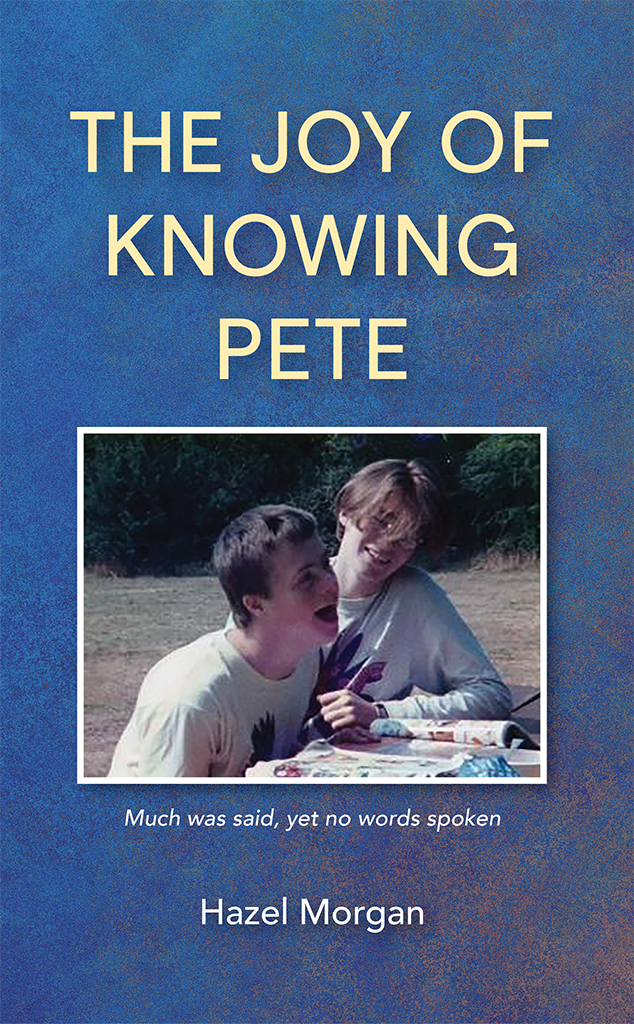
|
Available on Amazon
Reader Reviews... British Journal of Learning Disabilities January 2023 This book is an enjoyable read. I recommend it to a wide readership....'The Joy of Knowing Pete' is a rare treat as few books have been written about the life experiences of people with profound and multiple learning disabilities...Pete's life story is a plea to challenge discrimination, act imaginatively and enable all people with learning disabilities to live full and healthy lives in their own communities, where they are treated equally. NASEN’s Connect magazine July 2023 The Joy of Knowing Pete is a heartwarming story…Hazel shows the importance of developing experiences for those who are non- verbal with complex needs….It is clear Pete has inspired the family…..the detail in this book will help to change society, develop inclusion and ultimately change the way we care for those with learning disabilities. nasen.org.uk Sarah Palmer, Emeritus Professor in Maritime History, The University of Greenwich This book is a kind of love letter, not just to Pete but to the power of memory itself. Never sentimental, it is very moving. Rev. Janet Bellamy This is a loving and yet unsentimental depiction of life with Pete, beautifully drawn, in which Pete’s gift of himself to the family is powerfully illustrated and (implicitly) their gift of themselves to him is also movingly evident. Dr Sue Brown, Writer Hazel's book will contribute to a better recognition of how important it is to recognise the wishes and needs of those with disabilities and take them far more into account in responding to them. No one speaks with more insight and authority about that than she does. Virginia Astley Writer Through a series of snapshot recollections and the words of those who knew him, Hazel Morgan provides the reader with a memorable and poignant account of her son’s life…… The joy that Pete expresses in his own particular way radiates throughout the book and leaves the reader with the sense that this young man’s life touched a great many others. Christine-Koulla Burke, Director the Foundation for People with Learning Disabilities This book is beautifully written with fairness and equality at the heart, reminding us that all life is precious. Sally Bayley, Writer Hazel’s book is a moving account of how one family learned to live - often joyfully - alongside a young son with a disability. There is not a shred of self pity here, only a reminder of the brevity of all our lives and our universal desire to make meaning. John Swinton, Professor in Practical Theology and Pastoral Care, The University of Aberdeen This is a lovely book. It’s a testimony to Peter, but it is much more than that ... Hazel gently and kindly brings Peter’s voice to the fore. Chris Hatton, Professor of Social Care, Manchester Metropolitan University This is a beautiful and moving memoir - of joy, grief, pain, faith, belonging, love, and a life well lived. Christine Towers, Director, Together Matters This is Peter’s story written many years later. It also subtly hints at the need for the rest of society to be more inclusive and for a greater national policy commitment to people with learning disabilities. The Adventures of Agnes : Wartime nursing in Bulgaria, Poland, Persia and Russia 1912-1919
| |||||||||||||||||||||||||||||||||||||||||||||||||||||||||||||||||||||||||||||||||||||||||||||||||||||||||||||||
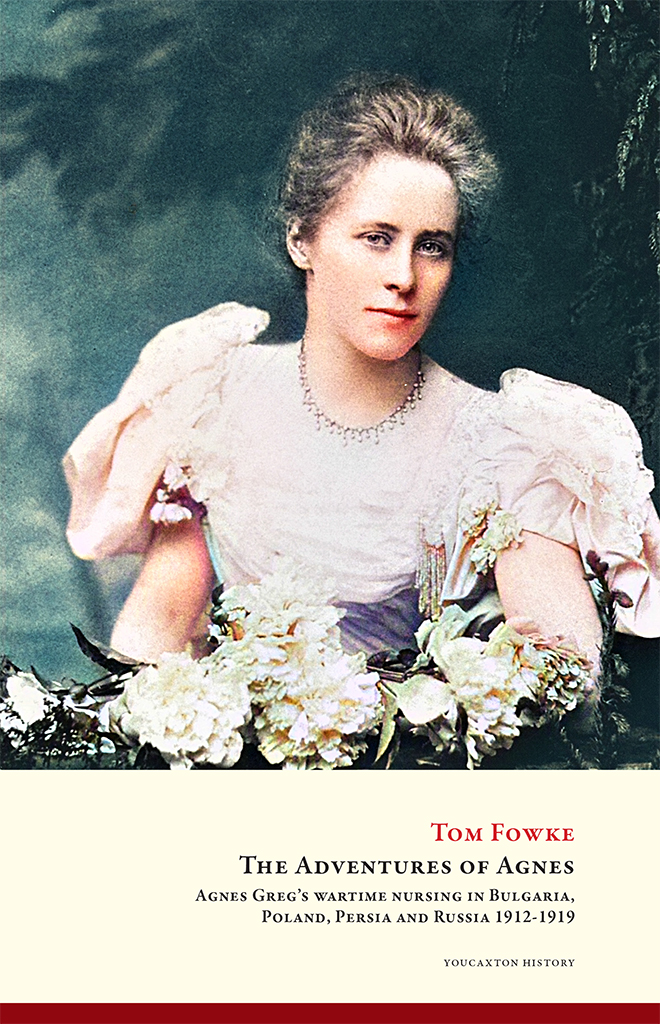
|
The Adventures of Agnes
Agnes Greg was born into a wealthy Lancashire cotton family. In 1912 a middle-aged Edwardian lady at a loose end, she decided to try her hand at nursing. Providentially, after many years of peace, Europe just then became engulfed in war and opportunities arose. Barred from nursing for the British, for seven years she worked behind the front lines of friendly or allied armies in the Balkans, Poland, Persia and Russia often in improvised field hospitals and dressing stations in difficult conditions and she journeyed long distances between them, often by primitive means. She had a traveller’s eye for landscapes and places of interest and mixed easily with local and expatriate populations. She nursed Turkish prisoners of war in Bulgaria, local peasants, Russian soldiers fighting Austrians and Germans in Poland and fighting Turks in Persia. At times she was seriously ill herself and she was trapped in the Caucasus for nearly two years during the Russian revolution and civil war. This book uses Agnes’s extensive correspondence with family and friends so that the reader hears her adventures described in her own vivid and amusing words and all intermingled with private and domestic concerns illustrative of her epoch and circumstances. Additional background material provides the political, military and family contexts. |
| ||||||||
| Tom Fowke was formerly a civil engineer in various areas of the water industry. He is a great-nephew of Agnes Greg, and is married with two children and two grandchildren. Now retired to England, he previously worked for periods in Qatar, Iran and New Zealand, and lived for some years in Spain. | ||||||||||
Memoir of a Bluebell Girl
Jane Hoggar

|
At the age of twelve, Jane had to abandon her dreams of becoming a ballerina. Measuring six-feet tall with size nine feet, she reluctantly gave her tutu way, instead, sewing herself a sequinned boob tube and turning her ambitions to Top of the Pops, Pans People and the exciting world of cabaret. Demonstrating a natural ability to stay calm in a crisis, Jane breezes through the most challenging of situations on a variety of exotic work engagements. Encouraging us to see the world through her rose-tinted spectacles, she navigates her way around compelling dramas and romantic liaisons that keep us on the edge of our seats. Treating us to a fascinating window on the world of show business, Jane describes her exciting travels around the globe during the 80’s that eventually lead her to the remarkable Margaret Kelly, better known as Miss Bluebell of Le Lido de Paris. “You certainly perused the box of chocolates before you decided which one you wanted didn’t you dear?” Jane’s husband commented after reading Bluebell Girl, referring to the multitude of boyfriends in the story. “Absolutely!” she declared, “I discarded the soft centres, complicated chewy ones and eventually chose the solid, reliable, hard nut!” |
£16.99 (+ £3.50 postage) Available from Amazon |
||||||||
|
Jane trained at theatre school during the 80’s and then took off around the world, devising ways and means of finding employment on and off stage. Jane’s work placements have been varied to say the least, from Can-Can dancer to dinner lady, in places as diverse as Ipswich and Tokyo. Her enthusiasm knows no bounds when there is a challenge to cope with, demonstrated perfectly in her previous book, Chemo Summer, where covering a serious topic she still manages to treat us to the full force of her witty approach to difficult personal circumstances. Jane lives in Suffolk with her husband. |
||||||||||
Ramsbottom’s Revolutionary Doctor – The Life of Peter Murray McDouall
Nigel Jepson
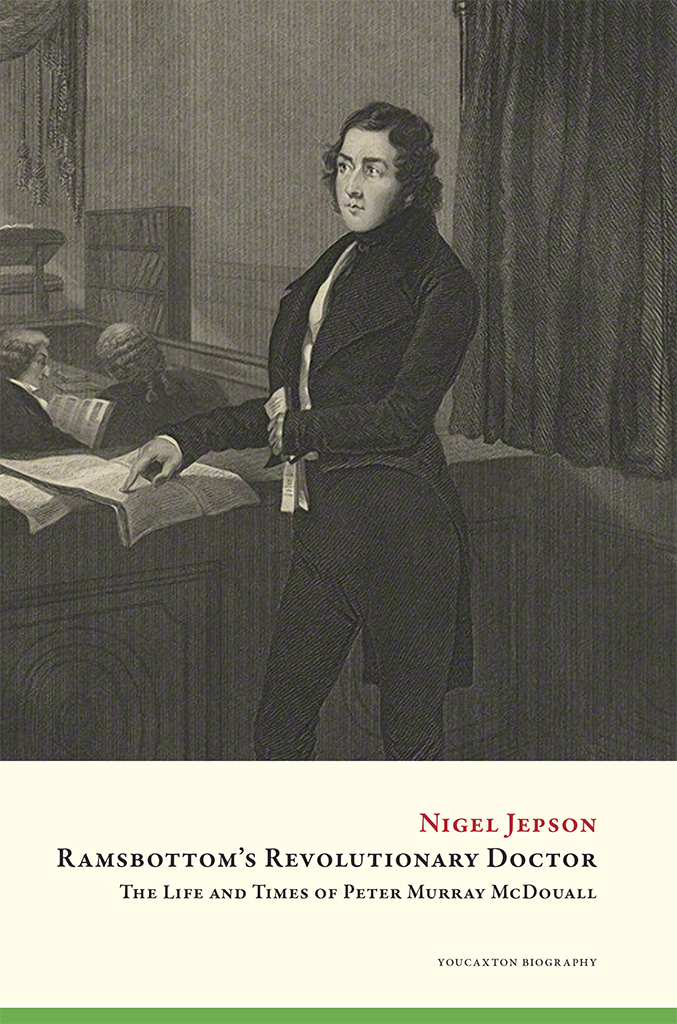
|
Arriving in Ramsbottom in 1835, aged only 21, McDouall is appalled at the state of health endured by factory workers. He condemns the treatment of them as inhumane. However, no-one seems prepared to listen to him. This is the great age of the Industrial Revolution and the Factory System is the price that has to be paid. Possessing a fiery, idealistic temperament, he cannot stand back though. Championing the rights of workers becomes a natural course of action despite it bringing him into further contention with the Grants. Not confining his protests to the cotton town of Ramsbottom, McDouall is attracted towards becoming a leader in the militant movement of Chartism which, raging like wildfire throughout the industrial North, crusades for working class people to be given the right to vote. |
|
||||||||
|
With McDouall delivering impassioned speeches across the country advocating the use of physical force to overthrow the Government if necessary, Ramsbottom’s Revolutionary Doctor reveals the turbulence of the times and the deep conflict developing between ‘two nations’ within one country. Armed insurrection appears inevitable when Parliament is not only unwilling to agree to Chartist demands but sets out to exact hefty retribution on ‘ring-leaders’ like McDouall. While nothing seems to daunt him, incurring two separate prison sentences as well as a period of enforced exile in France, he is eventually destined to die in mysterious circumstances in Australia at the age of forty.
This is the compelling story of a courageous young man who sacrifices his career and family to fight for a cause that he must know will also ultimately cost him his life.
Nigel Jepson lives in Ramsbottom and is a keen supporter of Ramsbottom United. He moved to the area in the mid-90s after taking up post as Head Teacher at nearby Haslingden High School. His last UK head’s post was at Kearsley Academy in Bolton from 2010 to 2014. ‘Retired’, he has carried out interim work abroad in the meantime, serving as Principal in Dubai during 2016 and carrying out a teacher training programme in schools in New Delhi in 2018. | ||||||||||
A Miner Goes to War – Service in North Africa and Italy
E. C. Hamer
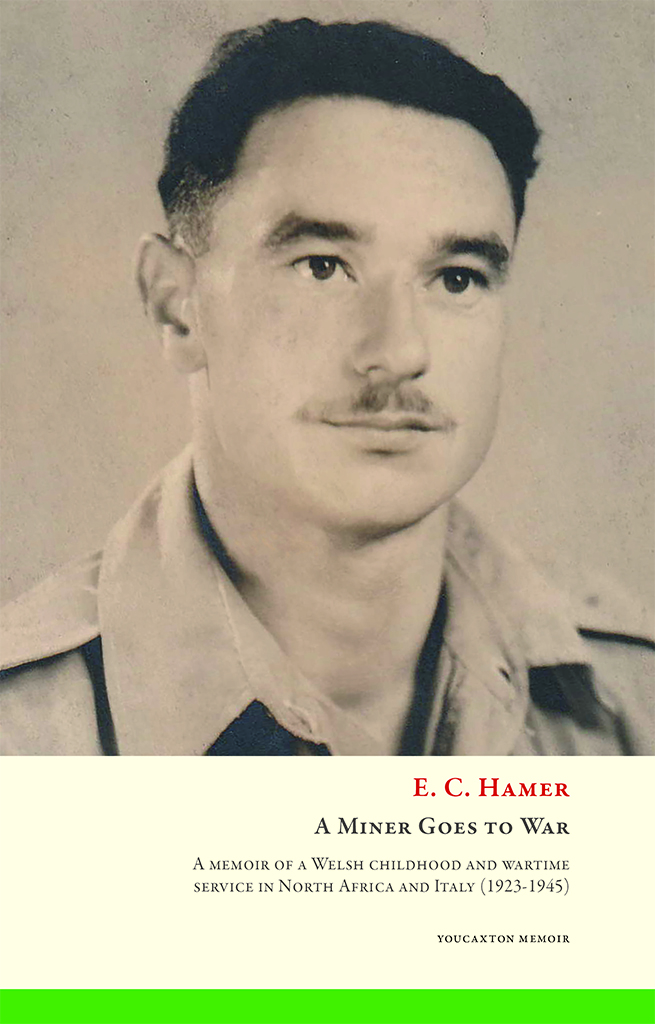
|
A memoir of a Welsh childhood and wartime service in North Africa and Italy (1923-1945) Edited by Pat Wilson, Ernest Hamer and Anne Kleiser Eddie Hamer’s memoir gives a unique insight into working-class life in the first half of the 20th century. It is often humorous, sometimes angry, and always informative. It begins with a history of his workingclass Welsh mining family, based on his own memories and on a series of discussions with his father in the 1960s - while there was still time to record first-hand accounts of his family’s story in the decades before he was born. There follows his childhood in Huddersfi eld and North Wales in the 1920s. The poverty and hardship that his family endured is vividly described and the now-unthinkable responsibilities he had to shoulder at a young age - but this was also a boyhood of freedom, camaraderie and adventures. The final sections of Eddie’s memoir are based on the diaries he kept during his service in World War 2: his training in the U.K. and his service in North Africa and Italy as a gunner in the Royal Artillery. |
£11.99 (+ £3.00 postage) |
||||||||
|
After the war he qualified and eventually became Chief Mining Surveyor in two collieries in South Wales. He was married with one son and one daughter and died in 1990. |
||||||||||
Alison Hembrow, The Royal Regiment of Wales Museum
This book is a gem: a combination of recollections of working-class childhood and early adulthood in the first half of the twentieth century, family stories, and war diaries – all seen through the lens of a fiercely independent man with strong socialist views. It’s a valuable first-hand insight into lives and times that are in danger of being forgotten. It’s also a gripping and eye-opening read which has been carefully brought to press by members of Eddie Hamer's family who recognise the importance of his memoir.
“A Miner Goes to War” is presented in two distinct halves. The first is recollections of childhood and early life growing up in a working-class family in Wales and Yorkshire in the 1920s and 1930s. Recorded several decades later, Eddie's strong left-wing views shine through in his emotive descriptions of his family being part of “the rabble of history”. His mother’s family were Welsh miners, his father's family woollen workers from mid-Wales, both struggling to find regular employment and make ends meet.
Moving to Yorkshire in search of work, Eddie’s family found themselves in cramped accommodation unfit for human habitation. His early teens featured trips to the abattoir to collect a bucket of intestines to provide meals, war-wounded teachers, earth closets, early deaths, and further deprivation during the General Strike.
At 14 Eddie leaves school and goes down the mine. He and his family are now in north Wales. Detailed descriptions of the working conditions, equipment used, and jobs done give an insight into a harsh world in which pit disasters and deaths were frequent. His aptitude is spotted and he starts night school classes to qualify as a mining surveyor.
Although the memories aren’t all chronological, and they are seen through the prism of Eddie's adult beliefs, they give a strong flavour of lives which were lead by many but recorded by few. Interspersed with vignettes touching on current affairs, they bring to life an existence experienced by millions in a way a more traditional historical account cannot.
Photos and hand-drawn maps and plans divide this first section from Eddie's war diaries which form the second half of the book. These diaries have a different character altogether. Written as he completed his basic training as a gunner in the Royal Artillery and served in North Africa and Italy, they have an immediacy and level of detail that gives a sobering insight into the day-to-day experiences of a soldier and the horrors of war.
Eddie brings an admirable humanity to his encounters on active service: fetching a medical orderly to dress the wound of a young Italian girl, sharing water-melons with Arab children, cooking fried tomatoes with locals. His interests are wide-ranging: he describes the workings of Italian bombs, the quality of German dugouts, the architecture of mosques, the historical interest of Pompeii compared with the squalor of Naples, and rearing Regimental turkeys for Christmas lunch. He also records the 104 degree fever he suffered, the horrors of rampant dysentery in the regiment, the limbs lost by close comrades in a premature explosion, and cemeteries full of teenage German casualties.
When Eddie's narrative ends in 1944 , his brief notes and Release Leave Certificate are included as an Afterword. His military conduct was officially described as “Exemplary”. “A Miner Goes to War” is exemplary in preserving for future generations and researchers the personal experience of an upbringing in a mining family and service in World War Two. Having just read Captain Tom Moore’s “Tomorrow Will Be A Good Day”, I can see parallels in two accounts of growing up in the 1920s and serving in World War Two from contemporaries who both bring a personal perspective to aspects of national history.
Books such as this add a different dimension to more traditional accounts, and are a valuable addition to the bookshelves of anyone wanting to find out more about aspects of life in the first half of the 20th century.
Review of “A Miner Goes to War” by Neil Wilson
I really enjoyed “A Miner Goes to War”. The memories are personal, but they seem to capture the period very well. It’s a powerful reminder of what the world was like when the welfare state was a lot smaller. Anyone who utters the words, ‘safety gone mad’, will be reminded of what the world could be like; a world where people get killed in accidents and everyone else carries on working. Reading this book made me realise how much we take for granted in modern Britain. Social improvements were hard won, and can be easily lost.
It’s a book with powerful contrasts. This was an era when kids could play on the local scrap heap, build tree houses in the woods, swim in the river and crawl under the market stalls looking for fruit. But this childhood freedom is tinged with a sense of fatalistic sadness. Once he was in the army, he never knew where he would be in a few hours. Every moment of the day was planned for him, mingled with the unexpected attack from a passing plane or an ambush.
Each memory is filled with powerful emotions, taking the reader back in time. As he walks through the woods past a house that’s supposed to be haunted, we imagine how we’d have felt as young child. There are moments of tension, when a farmer catches them stealing apples. Moments of enchantment, when his uncle dresses up as Father Christmas. Moments of anger, when workers are deliberately under paid. We see the world through E. C. Hamer’s eyes, and grow older with him. He really captures how a person thinks at different ages, but with little retrospectives showing how he saw things as an older adult. Considering how much hardship there is, from the miners’ strike to the war, there’s a positive feeling to the book. There are many moments of camaraderie, from the kids building a bonfire together, to the miners playing their instruments underground. There’s a feeling that people do come together in the face of adversity.
E. C. Hamer captures the realities of war very well. There are so many details, like the friendly fire, the shells that malfunction, trading soap for eggs with the locals, the ‘enemy’ leaving dirty protests in the houses before they retreat and the German deserters they find hiding in a cave.
His account comes across as remarkably honest. E.C Hamer has a lot to be proud of, but he also shares his regrets, including one time as a child when he was peer pressured into putting a firework through someone’s letter box. It’s a combination of stark honesty, bravery, hard work, empathy, ironic humour and self reflection, that makes E.C. Hamer such a likeable narrator.
From Chapel to Chief Constable – Memoir of a Policeman
Tony Leonard
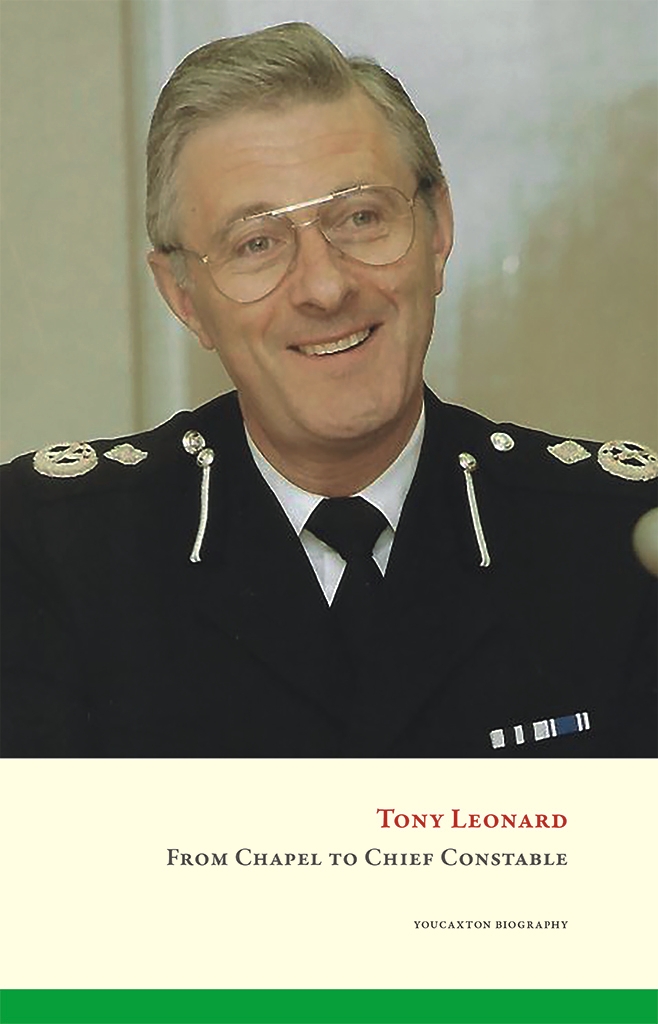
|
From Chapel to Chief Constable Principles, Politics and Public Service Tony Leonard Tony Leonard was born into a working-class family in Kirkburton in Yorkshire and grew up in a tied house in the grounds of a mental hospital. There he mixed with the staff of the hospital and with their children, encountering a far wider variety of nationalities, languages and political cultures than a working-class lad would otherwise have encountered in the locality. Thiis memoir describes his personal and professional journey from that small, self-contained community, via the LSE where he was a sociology graduate and Hull University where he gained a Doctorate in Politics, into the national and international world of policing. He served in four diff erent police forces, rising from constable to Chief Constable. |
£5.99 (+ £2.50 postage) Available on Amazon |
||||||||
|
|
||||||||||
Tales of a Leicestershire Detective – Murder and the Golf Course
Simon Shuttleworth

|
Tales of a Leicestershire Detective Simon Shuttleworth was a police officer in Leicestershire for thirty years. He investigated some of the most appalling crimes ever seen in the East Midlands. These included the grooming, rape and murder of fifteen-year-old Kayleigh Haywood, the horrific firebombing of an innocent family and the despicable fatal attack on a beloved Turkish family man in his flat in Leicester. But even detectives engaged in the most serious cases need downtime and relaxation. In Simon’s case, this meant organising the annual police golf trip. That would be all very well for a good golfer but Simon, by his own admission, was no Nick Faldo. Golf can be relaxing, frustrating, annoying and fun all at the same time but on those trips, playing golf was only half the story. |
£8.99 (+ £3 P&P UK only) Available from Amazon | ||||||||
|
Prince Charles, Leeds United, naked dancing, rancid chickens, broken windows, sleepwalking room-mates, a golf-course bugler, unrequited love, toilet-roll fires and Roy Chubby Brown don’t cover half the near-the-knuckle adventures of those cops on tour. But the golf was just an escape from what really mattered: murder investigation. Bringing to justice people prepared to commit the most heinous crime of all, people who thought they could, literally, get away with murder - that was something worth fighting for. |
||||||||||
|
Reviews... 18.07.2021 - ★★★★★ A well written book with just the right blend of humour and sensitivity. Amazon Verified Reader Simon expertly conveys how murder detectives deal with horrific cases and then find distraction in that noble leisure pursuit that can be found on a golf course - plus the consumption of quantities of alcohol and plenty of funny antics along the way. He gives insight to some key investigations and the many people affected by a murder - and also introduces us to some of the varied 'characters' who are murder detectives. A well written book with just the right blend of humour and sensitivity. 24.07.2021 - ★★★★★ A varied read- funny and interesting. Sophie Ferguson A great book to read from many varied angles-interesting and funny. Some parts are thought provoking when you read about the impact of crime on not only the victim and their families but also in the families of police officers! There are also plenty of light hearted sections and insight into the actual world behind the public view of policing. |
Rescue Tugs at War – Dangerous missions in the 1940s
Stanley Charles Butler RNVR
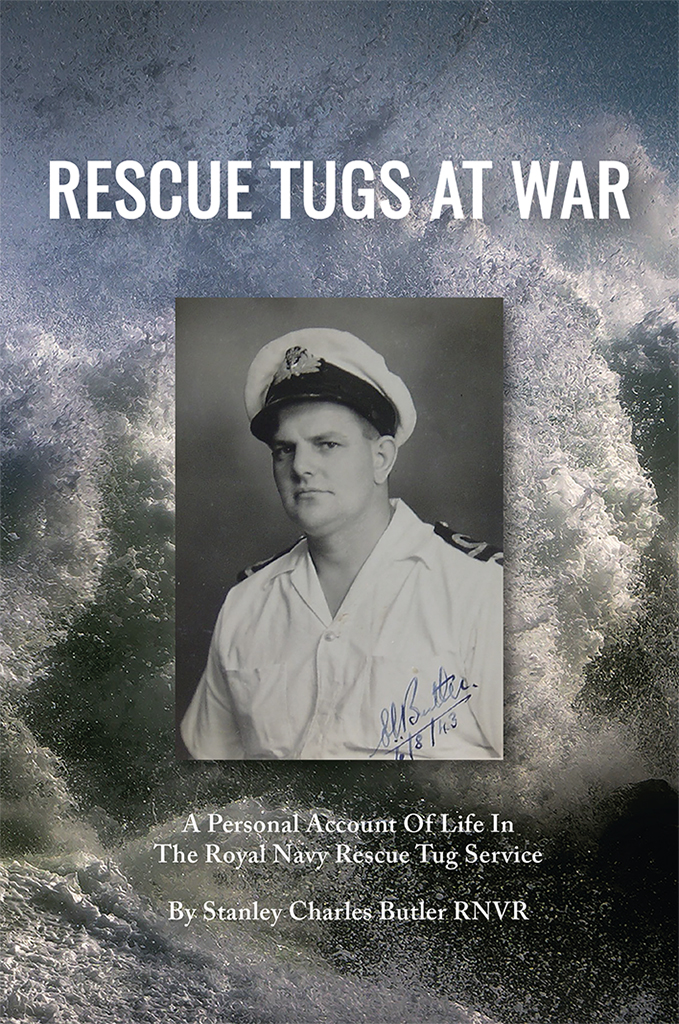
|
RESCUE TUGS AT WAR A Personal Account Of Life In The Royal Navy Rescue Tug Service Edited by Peter P Butler In 1940 Stanley Butler answered the call for merchant navy personnel to join the Royal Navy rescue tug service. For two years he served on HMRT Restive as second engineer, escorting convoys across the North Atlantic. The atrocious weather conditions and attacks by U-boats left many ships in distress. Restive also aided convoys from Iceland to Murmansk in northern Russia. Stanley Butler was usually part of the boarding party sent to assist these stricken ships and the casualty would be towed to either Iceland or the UK. In 1943 he was promoted to chief engineer and was transferred to HMRT Prudent, which was based in Durban South Africa until the end of the war. |
| ||||||||
|
This very personal account gives a snapshot of his life in the 1940’s. Stanley recalls many humorous misadventures during shore leave, and gives some very detailed accounts of rescues he was involved with. There are wonderful descriptions of family life, and the difficulties of travelling by rail in the UK during the war. Stanley survived the war despite the many dangerous situations he was in. In an ironic twist of fate, his wife and child were killed in one of the few air raids on rural Cornwall. Stanley Butler grew up on a farm near Colchester with a passion for steam traction engines. In 1936 he joined the merchant navy as an engineer and spent the next four years in the Far East. Based in Japan for a year, Stanley made many journeys inland by train. During WW2 he served in the Royal Navy. After de-mob he worked in Caltex Oil Company in Dublin for 12 years. His next job was with British Coal. For this he moved with his wife and 3 children to Sheffield, close to the beautiful Peak District. Most week-ends he would bring his children and grand-children out on walks or visits to places of interest. It was a shock to everyone when he died suddenly at the age of 66. |
||||||||||
|
Reader Reviews... Dean Longley Insightful personal account of life of a Navy Engineer during WW2, during the often treacherous sea condition combined with constant attacks to vessels. The personal feelings, thoughts and actions are well presented and the book is a joy to read. Recommended for all those interested in individual accounts and tales of WW2. Kindle Customer An excellent read, detail and story. Would make a great present for anyone interested in Rescue Tugs during WW2. Really an impressive read. James, Sheffield I like Stanley's way of writing and the little stories he included about the ships and places he visited as well as the technical details of some of the encounters with stuck ships. The way you finished his story of the U-boat was well evidenced. I would recommend it |